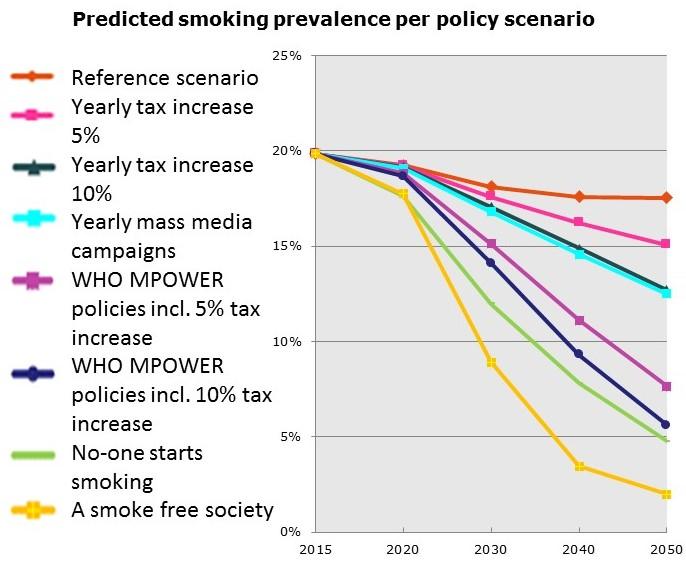Home
Issues
Aims and Scope
Open Access
Editorial Board
Indexing
Why publish with us
Contact us
Instructions to authors (PDF)
Manuscript Types
Manuscript Formatting
How to submit
Preprints
Special Publications & Reprints
Authorship & COI
Principles of Transparency Checklist
Data Policies
Publication Ethics and Publication Malpractice Statement
Social cost benefit analysis of tobacco control policies in the Netherlands
1
Dutch Alliance for a Smokefree Society, Netherlands
2
Trimbos Institute, Centre of Economic Evaluations, Netherlands
3
Dutch Cancer Society, Netherlands
Publication date: 2018-03-01
Tob. Induc. Dis. 2018;16(Suppl 1):A141
KEYWORDS
TOPICS
ABSTRACT
Background:
The objective of this study was to investigate all the societal costs and benefits of tobacco control policies in the Netherlands in order to tackle the economic and financial argument of the tobacco industry.
Methods:
A social cost benefit analysis (SCBA) was used to calculate the costs and benefits of different tobacco control policies from now until 2050 in the Netherlands. Predicting models were used to calculate the impact of tobacco control scenarios on smoking prevalence, deaths, health care impact, consumer surplus, quality adjusted life years, productivity, government incomes, and other actors in society. The tobacco control scenarios we investigated were mass media campaigns, different levels of taxation and multi-policy package based on the WHO FCTC's MPOWER package. Furthermore we looked at the social costs and benefits of a scenario in which no-one starts smoking from 2017 onwards. These scenarios were compared with a reference scenario in which no changes were assumed in the government's current smoking-related policy for a period of 35 years.
Results:
In the reference scenario by 2050, the prevalence of smoking decreased by 2.3 percentage points, compared to between 4.8 and more than 14 percentage points in the alternative scenario's. All alternative scenarios result in positive net benefits between 2 and >100 billion Euros over the entire time horizon. The MPOWER scenarios in which a combination of tax increases with other policies are introduced, result in benefits for consumers, employers and government through tax incomes.

[Predicted smoking prevalence per policy scenario]
Conclusions:
The health and economic burden of tobacco use is enormous. The intervention costs for the tobacco control policies are minimal, and investing in health is beneficial from both the public as the economic perspective. This study can act as an example/guide for other researchers and decision makers to investigate their own countries' social costs and benefits.
The objective of this study was to investigate all the societal costs and benefits of tobacco control policies in the Netherlands in order to tackle the economic and financial argument of the tobacco industry.
Methods:
A social cost benefit analysis (SCBA) was used to calculate the costs and benefits of different tobacco control policies from now until 2050 in the Netherlands. Predicting models were used to calculate the impact of tobacco control scenarios on smoking prevalence, deaths, health care impact, consumer surplus, quality adjusted life years, productivity, government incomes, and other actors in society. The tobacco control scenarios we investigated were mass media campaigns, different levels of taxation and multi-policy package based on the WHO FCTC's MPOWER package. Furthermore we looked at the social costs and benefits of a scenario in which no-one starts smoking from 2017 onwards. These scenarios were compared with a reference scenario in which no changes were assumed in the government's current smoking-related policy for a period of 35 years.
Results:
In the reference scenario by 2050, the prevalence of smoking decreased by 2.3 percentage points, compared to between 4.8 and more than 14 percentage points in the alternative scenario's. All alternative scenarios result in positive net benefits between 2 and >100 billion Euros over the entire time horizon. The MPOWER scenarios in which a combination of tax increases with other policies are introduced, result in benefits for consumers, employers and government through tax incomes.

[Predicted smoking prevalence per policy scenario]
Conclusions:
The health and economic burden of tobacco use is enormous. The intervention costs for the tobacco control policies are minimal, and investing in health is beneficial from both the public as the economic perspective. This study can act as an example/guide for other researchers and decision makers to investigate their own countries' social costs and benefits.
Share
RELATED ARTICLE
We process personal data collected when visiting the website. The function of obtaining information about users and their behavior is carried out by voluntarily entered information in forms and saving cookies in end devices. Data, including cookies, are used to provide services, improve the user experience and to analyze the traffic in accordance with the Privacy policy. Data are also collected and processed by Google Analytics tool (more).
You can change cookies settings in your browser. Restricted use of cookies in the browser configuration may affect some functionalities of the website.
You can change cookies settings in your browser. Restricted use of cookies in the browser configuration may affect some functionalities of the website.

